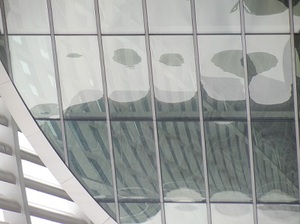
 Photo: I.Rimanoczy
Photo: I.Rimanoczy
A few days ago I came upon a website called Good for Nothing. The reason I felt intrigued to explore the website, I confess, was the title: Good for Nothing. I have, frankly, thought this applied to me numerous times over my lifetime! Being interested in so many things, exploring and trying out this and that, I heard this voice frequently inside my head -- especially as I left one interest and transitioned to the next one. With success being often defined as "making it," through the acquisition of money, recognition and power, it has been difficult for me to fit the journey of my migrating interests into this definition.
More than a website, Good for Nothing is an organization, or as they describe themselves, "a community of thinkers, doers, makers and tinkerers applying their skills and energy to accelerate the work of cause-led innovators and change makers."
They invite people interested in working together in very diverse groups on ideas and challenges that create "what a flourishing 21st century society might look like." In other words, they are not blaming governments, corporations, bankers or climate change for what our planet looks like -- instead they step up with a fun-filled spirit and say, "Let's do something to make this better!"
I asked Tom Farrand and Dan Burgess, creators of GFN, how they came up with this idea.
We set up GFN based on our own personal dissatisfactions of how we were starting to see the world around us. Massive inequality, environmental destruction, the monetization of everything, the breakdown of community, and time stressed people working all hours and in ways that didn't seem to make them that happy! We heard about this idea that we've actually got a crisis -- it's a human energy crisis and we wanted to do something about it.
We had spent a big chunk of our careers working in what we call commercial creativity. Helping mainly large brands/corporations create new products and services and then helping them market and communicate to get more folks to buy more stuff and ultimately to make more money for a group of shareholders. Nothing wrong with that, that's the current dominant system we're all a part of.
But we were becoming uncomfortable with that. And bored too. The amount of talent, skill, energy and intelligence that primarily goes into the process of extracting resources from nature and making money for others is astounding. At the same time we were seeing amazing innovation happening at grassroots by people with no resources trying to solve real social and environmental issues, bringing amazing ideas and creativity and a much more experimental, 'try stuff' approach to making stuff happen. The opposite of how the corporate world works.
To illustrate the point, a good friend of ours spoke at an advertising conference called Battle of the Big Thinking where hundreds of people were paying a lot of money (and whose time represents huge commercial value) to hear marketing and advertising experts jostle and compete with each other for the 'Big Ideas' that are really just smarter, better ways to sell more people stuff they don't need to impress people they don't know. We thought that was pretty pointless.
So we thought we'd start an experiment. Instead of talking, we wanted to make some doing happen. Turn the brainpower and energy into something more valuable. Bring a group of skilled creative talent together with a bunch of grassroots social innovators and change makers who never normally get access to that kind of resource. Strip out the process and ego-driven hierarchical approach of conventional work, create a challenge with constraints e.g. time limit, no money, create a more fun and experimental environment and see how much can happen when you let people self organize and use their talents on something they care about. We called it Good for Nothing, because no money is involved. It's a generosity exchange. It went well and four years later here we are...
People of all ages and ethnicity find a challenge that could use their skills and work collaboratively on and offline through 24- to 48-hour "gigs" -- creative working events. I found chapters in UK, Netherlands, Sweden, Singapore, USA, South Africa, Cambodia, Thailand, Canada and Australia.
Tom says it's hard to tell how many people are involved. Over 3000 are signed up in the network but hundreds of others have taken part in different gigs, from pub versions that last three hours, through two-day gigs. There are currently 34 chapters in 31 cities in nine countries, and the number is growing. They estimate about £1.5 million (over US $2.5 million) of professional time has been gifted to numerous projects. In the UK chapters have supported about 70 projects -- some of these have gone on to become successful sustainable social business and enterprises.
Listening to the statements of some of their members, I found how they were thrilled to participate because it was fun, because they could bring their talents to a good cause, because they could see how they made a difference, because by volunteering in causes they liked they got an unparalleled feeling of joy and satisfaction. On top of that, they valued meeting other people who share a similar desire. They are not paid for it -- but they feel they can be of service, for the greater good, and it is fun. "We've been tracking it, and it creates all kinds of other value and wealth for people, beyond money", says Tom.
As one person put it: "It feels better than... pretty well anything else! That is what work should be like." In a new mindset world, perhaps to be good for nothing is becoming something attractive, after all. Perhaps good for much.
Keywords: Redefining success. Collaboration. Diversity. Empowerment of individuals, impact. Inspiration. Satisfaction of giving. Breaking the paradigm of why we do things. Finding others who have the same desire, and feeling we are more than we thought.